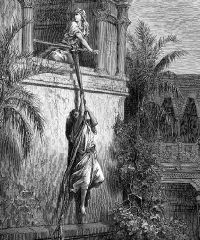Michal
- Not to be confused with Michał.
- For other uses, see Michal (disambiguation).
Michal (Hebrew: מיכל) was a daughter of King Saul in the Hebrew Bible, who loved and married David, who became king of the Israelite nation.
Their story is recorded in the Book of Samuel. In 1 Samuel 19, she chooses the welfare of her husband over the wishes of her father. When Saul's messengers are searching for David in order to kill him, Michal secretly sends David away while pretending he is ill and laid up in bed. Whilst David is hiding for his life, Saul gave Michal as a wife to Palti son of Laish, and David takes several other wives including Abigail.
Despite an apparent prohibition in Deuteronomy 24:1-4 on re-establishing a marriage with a previous spouse who has subsequently remarried, David demands the return of Michal after he is crowned in Judah following Saul's death. It is important to note by explanation that David had not divorced Michal at this point in time but rather Saul had made the act to break the marriage[1]. Therefore they were not technically divorced and David had not issued a writ of divorcement according to the biblical law. Nonetheless, Palti follows Michal weeping but Abner commands him to return home (2 Samuel 3:14-16):
- And David sent messengers to Ishbosheth, Saul's son, saying, 'Deliver me my wife Michal, which I espoused to me for an hundred foreskins of the Philistines.'
- And Ishbosheth sent, and took her from her husband, even from Phaltiel the son of Laish.
- And her husband went with her along weeping behind her to Bahurim. Then said Abner unto him, 'Go, return.' and he returned.
In 2 Samuel 6, Michal criticizes David because he dances, partially unclothed, as he brings the Ark of the Covenant to the newly-captured Jerusalem in a religious procession. Michal dies childless, which some say implies that this is a punishment (whether from God or from David is not clear) for her criticism.
David was succeeded as king of the Israelites by Solomon, David's son with Bathsheba.
Michal in poetry
- The Israeli poet Ra'hel Bluwstein sees a parallel between herself and Michal:
"Like you I am sad, O Michal ... and like you doomed to love a man whom I despise." (Poem "Michal" in her book Flowers of Perhaps.)
Michal “And Michal, Saul’s daughter, loved David And she despised him in her heart”
Michal, distant sister, time’s thread has not been severed, time’s thorns in your sad vineyard have not prevailed. Still in my ear I hear the tinkling of your gold anklet, the stripes in your silk garment have not paled.
Often I have seen you standing by your small window pride and tenderness mingling in your eyes. Like you I am sad, O Michal, distant sister, and like you doomed to love a man whom I despise.
Or alternatively translated: Michal Though years divide, we’re sisters yet; Your vineyard stands though weeds invade; Still tinkle anklet, amulet; Your red silk garment does not fade.
By a small window still you stand, Proud but a death within your eyes. My sister, I can understand – Who also love whom I despise. 1927, Israel Translated by Robert Friend
Use as a name
"Michal" had hardly ever been used as a name in pre-Zionist Jewish communities, but it was one of the Biblical names embraced by Zionism and is a very common female first name in contemporary Israel.
Notes
- ↑ Though the Book of Deuteronomy attributes itself to the period of the Hebrews' Exodus from Egypt, many historians regard it as having been actually written during the late monarchy. David's appearing to be oblivious to the prhibitions laid down in it seems an additional evidence in support of such theories.
ReferencesISBN links support NWE through referral fees
Credits
New World Encyclopedia writers and editors rewrote and completed the Wikipedia article in accordance with New World Encyclopedia standards. This article abides by terms of the Creative Commons CC-by-sa 3.0 License (CC-by-sa), which may be used and disseminated with proper attribution. Credit is due under the terms of this license that can reference both the New World Encyclopedia contributors and the selfless volunteer contributors of the Wikimedia Foundation. To cite this article click here for a list of acceptable citing formats.The history of earlier contributions by wikipedians is accessible to researchers here:
The history of this article since it was imported to New World Encyclopedia:
Note: Some restrictions may apply to use of individual images which are separately licensed.
